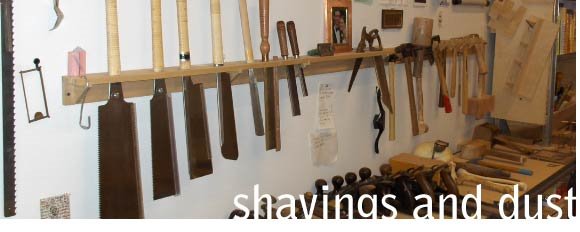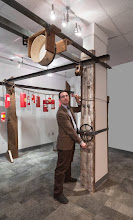went for dinner tonight to my favorite local sushi restaurant. As I sat there letting the toro melt on my tongue, a worker emerged from the kitchen with a vacuum package of tuna and handed it off to the second-in-command sushi chef. He put it on his cutting-board, and after quickly removing the plastic wrapping, stood and contemplated it for a moment. Pretty much the way that I look at an old chunk of wood when I first meet it.
He spun it around, and turned it over, and looked at it again, weighing the options and the responsibilities. Then he got out a sharpening stone and took a few swipes with his knife.
Well, hell, I thought. I know what he is doing, absolutely.
With his left hand he lifted the beautiful deep red piece of meat over once, and then again. He rotated it end for end. He held his knife against it and then stood back. I had this very same moment this morning with a complicated piece of white oak. There is a moment of thinking “this is too much. I can not cut into this, it is perfect as it is.” Then “Well, I have to cut into this. It is my job.” A catching of the breath, diving in. He took a long lateral cut with his knife. Smooth, precise, quick, that oh-so-Japanese quality of speed and precision that is so prised in that culture, a quick, perfect movement that you miss completely if you aren’t watching.
The first cut is the hardest.
Once the maker has committed, every subsequent choice is easier. The tuna spun and flipped. He leaned in to check the grain, flipped the piece to check his instinct, and then made another long cut. Deep red fillets started to pile up, each showing the grain of the muscle perfectly, each one destined to be many pieces of melt-in-your-mouth perfect toro. Captivating to watch. Every cut was considered and quick. With every cut another piece of tuna landed on the cutting board. Every piece made me think of an old friend that sailed from South Africa to Brazil, and how he talked about trailing a fishing line and catching tuna, and having sushi that had been alive five minutes ago, and how I would never have that experience. I also realized that if I was ever in that situation I would be completely lost as to how to reduce that living thing to food.
Watching this master ply his craft was soothing and exhilarating. There is always that moment when you watch someone do their thing well when you think “well how hard can that be? Looks pretty straight forward.” I often feel this when watching a good musician. Then I go home and realize how completely flummoxed I am. This was the same way, the ease that this man felt was infectious, making me think I should get some tuna and give it a shot myself, but having a complete realization that I would never be able to do what he does, not with the ease and surety that he does it.
I resigned myself to eating the product of his labor, in the way that others enjoy the product of my labor. We each of us have a calling, and we each of should be comfortable in that. I am pretty glad that I get to do what I do, and pretty grateful when I get to watch someone else fulfill their purpose.
Subscribe to:
Post Comments (Atom)


1 comment:
"We each of us have a calling, and we each of should be comfortable in that."
This sentence really struck me, particularly in light of my moaning about the state of publishing the other day.
I know that writing is my calling, I have known that since I was six years old, yet oddly enough I don't know that I am comfortable with that yet. And I am not sure what it will take to make me comfortable with it.
Post a Comment